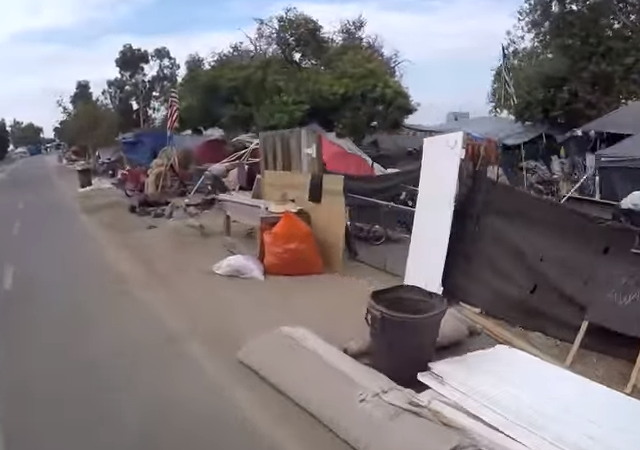Open-Air Drug Markets and Homelessness are Destroying American Cities
“a blight on the urban locations where they unfortunately often appear”

Mark Pulliam cites court rulings that have served to make the problem worse.
He writes at Law and Liberty:
The “Cruel and Unusual Punishment” of America’s Cities
The US Supreme Court recently decided to hear an appeal from the notoriously-liberal Ninth Circuit, in a 2023 case entitled City of Grants Pass v. Johnson, which effectively ruled (in the tongue-in-cheek words of the Wall Street Journal) that there is a “constitutional right to vagrancy.” Many observers believe that the Court will use the Grants Pass case as an opportunity to reverse an earlier Ninth Circuit decision, Martin v. City of Boise (2019), which held that laws prohibiting “camping” in public areas are invalid—and therefore unenforceable—because they violate the Eighth Amendment’s proscription of “cruel and unusual punishment.” The dubious basis for that ruling was that “homelessness” is not a voluntary status, unless the city provides sufficient shelter for all those who seek it. Therefore, the Ninth Circuit reasoned, it is unconstitutional to punish offenders for what amounts to an involuntary condition (ignoring the fact that sleeping in public areas is “conduct”—like public drunkenness—not status).
As explained below, Martin v. Boise was a facially ridiculous decision. Preventing cities from maintaining order in public spaces undermines civic society and ill-serves the population of drug addicts and mentally ill—representing the overwhelming majority of “homeless”—who need help. Grants Pass expanded the specious holding of Martin v. Boise on a class action basis, eliciting a torrent of vociferous dissent from the more sensible judges on the Ninth Circuit.
By banning the enforcement of anti-camping ordinances throughout the jurisdiction of the Ninth Circuit—which includes (among others) the states of Washington, Oregon, California, and Arizona—that court has overseen the proliferation of homeless encampments in Seattle, Portland, San Francisco, Los Angeles, San Diego, Phoenix, and countless other cities. “Homeless encampments”—a euphemism for the squalid detritus of vagrants, drunks, drug addicts, and mentally ill formerly derided as “hobo jungles,” “shanty towns,” or, during the Great Depression, “Hoovervilles”—are a blight on the urban locations where they unfortunately often appear. Especially in the western United States, sprawling homeless encampments have become ubiquitous, to the disgust and dismay of local residents. Martin v. Boise is largely to blame.
When I worked at the federal courthouse at 312 North Spring Street in Los Angeles in 1980, it was adjacent to a malodorous area known as Skid Row. The difference between then and now is that Skid Row is no longer an isolated area on the fringe of downtown Los Angeles; it has spread throughout the city. Similarly, the filth and pathos once limited to the Tenderloin district of San Francisco is now endemic everywhere in the Golden Gate City. Because of Martin v. Boise, municipalities within the Ninth Circuit are helpless to prevent public areas from being transformed into squatter camps, tent cities, and open-air drug dens.
 DONATE
DONATE
Donations tax deductible
to the full extent allowed by law.








